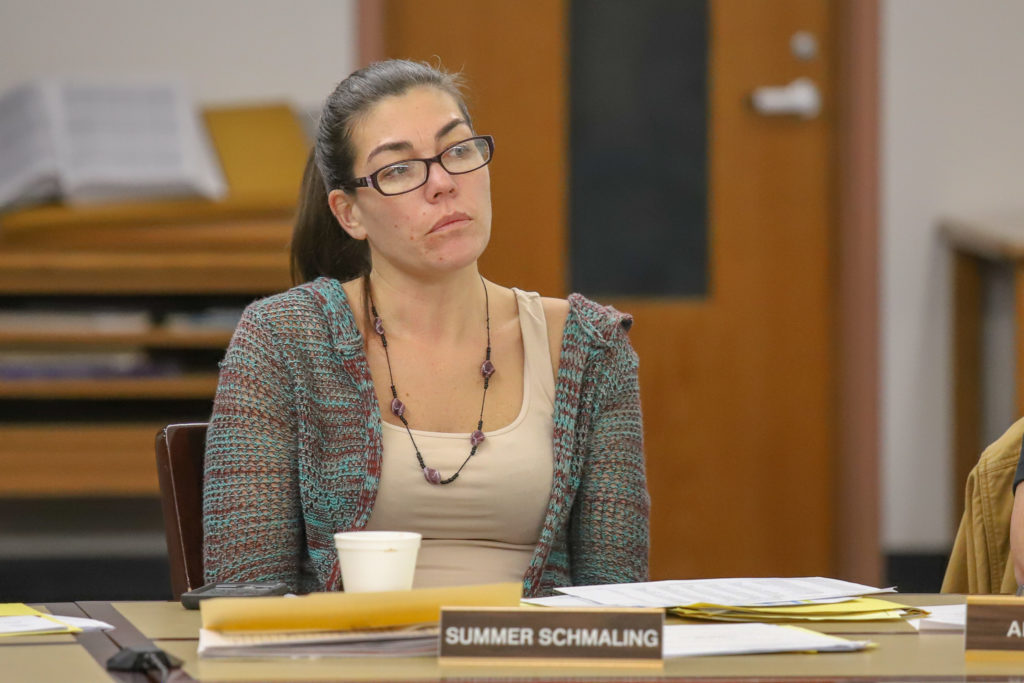
Summer Schmaling, chair of the Halifax School Committee at their meeting Feb. 4, 2019. (Photo by Abram Neal)
HALIFAX — At the Halifax School Committee meeting Feb. 4, 2019, school committee members discussed a letter penned by Steve Ruisi, president of the Halifax Teachers Association (HTA), with five recommendations for the budget at the School Committee’s annual budget hearing for fiscal year 2020.
Two people from the public at large attended the hearing: one elementary school teacher and one community member were present.
Ruisi, in his letter, thanked the chairman of the committee, Summer Schmaling, for the first opportunity “in some time” to have input on the budget.
The teachers say that they are mainly concerned about class size, especially in grades one and two where enrollment is high, they say, at 23-25 students, which they believe is significantly higher than the ideal “benchmark” of 20 students per class.
The committee framed this as an issue where an extra teacher would need to be hired, and an extra classroom space found, something the committee said is cost prohibitive.
And Principal Kayne Beaudry and Assistant Principal Brian Desantes indicated that they were less concerned about class size than the association. Beaudry noted that when he was a classroom teacher class size numbers were higher, although he acknowledged the many challenges of teaching to larger classes.
Silver Lake Regional School District Superintendent Joy Blackwood said that Halifax’s class sizes were comparable to surrounding communities, including district member Kingston Elementary School, although they are much higher than at the Dennett Elementary School in Plympton, where class sizes are unusually small due to the comparatively small size of the town.
The HTA would also like HES to hire four recess and cafeteria aides who they say would take the burden off teachers and classroom aides, in order to provide better management of the recess playground and the cafeteria. They say this would reduce student behavior issues in both venues.
School officials say that it would be hard to find people to work from 10 a.m. to 1 p.m. Schmaling suggested stay-at-home moms may be able to volunteer or work those shifts.
The association would also like to see a new special education position added. They say that would allow a special education teacher for each grade, 2-6. Under their proposal, Kindergarten and 1st grade would share one special education teacher, as is currently the case.
The HTA also noted that there is currently no math specialist at the school, and the teacher in the audience suggested this would be especially useful as students who struggle with math in lower grades often struggle throughout elementary school, she said. There is a literacy specialist, according to the association, just no math specialist.
But officials and committee members are reticent to create positions where someone once provided those services as part of their job description, noting that someone did have math “overlap” as part of their job at one time.
“None of our elementary schools have a remedial math specialist,” said Blackwood, although four part-time federally-funded educators, known as Title-I tutors, are available to students, two of whom address math deficiencies, she pointed out.
Finally, the association recommended the purchase of additional iPads and Chromebooks, which are heavily used in educating today’s students, say teachers. Some grades only have six per classroom which are shared among students, and they say that adding two more per room would help facilitate small group work.
Blackwood noted that some of the technology is being replaced as part of scheduled upgrades, and that she believes the school is “set” and that this is “not a priority right now,” although she appreciates the input from the association.
She said that in grades three through six, there is a Chromebook for each student.
“Certainly, all of these recommendations together are a lot to add to the budget, but any consideration would be an improvement to the educational experience at HES,” Ruisi, of the HTA, wrote.
The budget wrangling, far from over, continues.